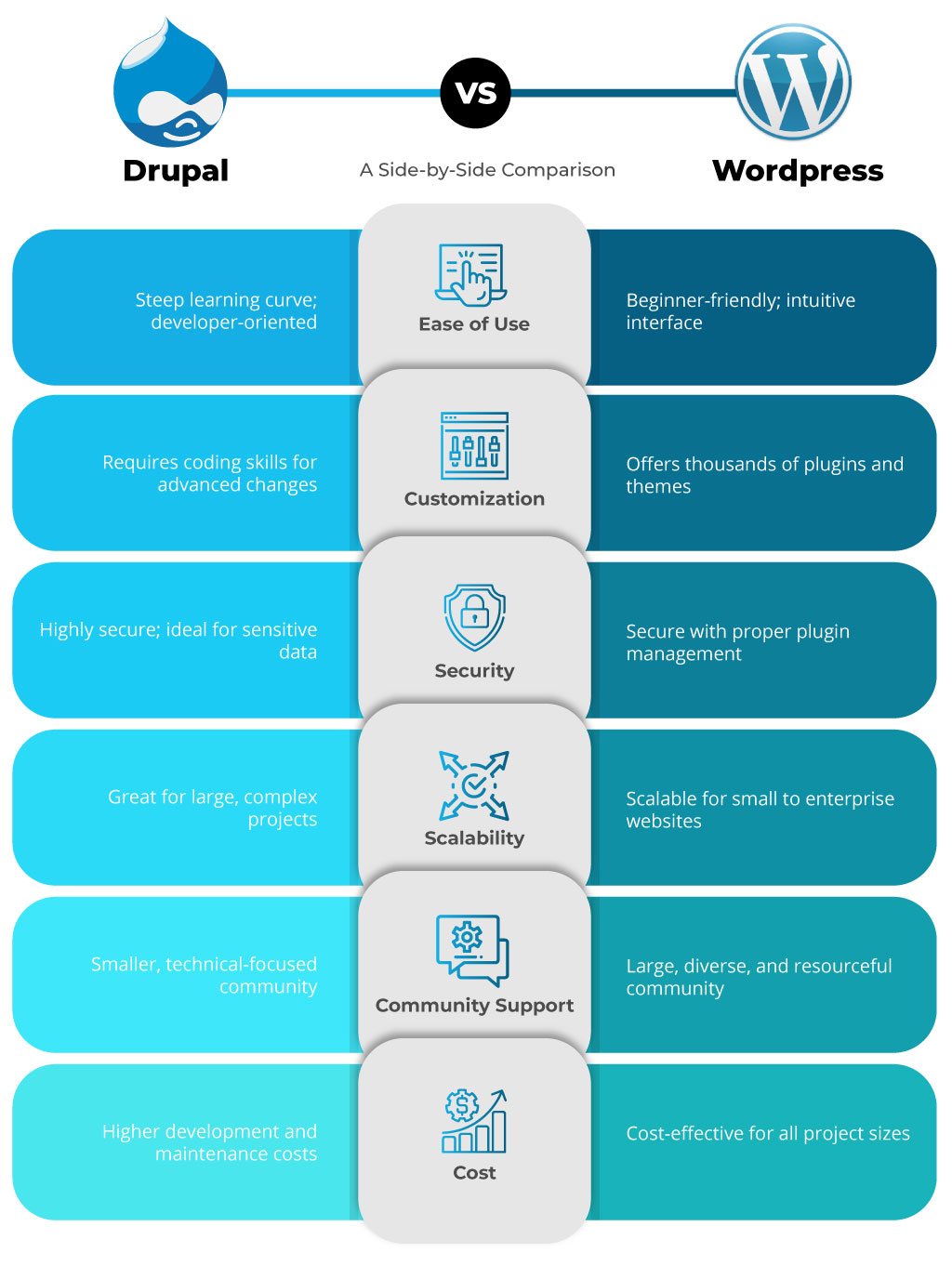Share Article :
In today’s fast-paced digital world, selecting the right content management system (CMS) is essential for businesses, especially for marketers and management professionals aiming to make a strong online impact. Among the most prominent CMS platforms are Drupal and WordPress. Both offer unique features and benefits, but each caters to distinct audiences and purposes. This article dives into the key differences between Drupal and WordPress, offering insights to help you choose the best option for your needs.

Introduction to Drupal and WordPress
The use of Drupal has significantly decreased over time, as it primarily serves niche markets like government websites and enterprise-level projects. In contrast, WordPress has become the go-to platform for most businesses, thanks to its unmatched popularity, versatility, and ease of use.

Drupal: Known for its flexibility and security, Drupal is a robust open-source platform often used for highly customized and complex websites.

WordPress: Powering over 40% of websites globally, WordPress is favored for its simplicity, extensive plugin options, and adaptability, making it ideal for marketers and management professionals.
Drupal vs. WordPress: A Side-by-Side Comparison

Why You Should Use WordPress Instead of Drupal as a Marketer

Ease of Use:
WordPress is designed to simplify content management. Its intuitive interface allows marketers to focus on strategy without needing technical expertise.

Extensive Plugin Ecosystem:
With over 58,000 plugins, WordPress can enhance website functionality, from SEO optimization to CRM integration.

Cost-Effective Solutions:
WordPress offers affordable options for small businesses and enterprises alike, with free and premium themes/plugins readily available. Know More Maximizing Profit with Cost-Effective Business Solutions

Vibrant Community Support:
The large WordPress community provides abundant resources, tutorials, and forums to troubleshoot or optimize your website.

Rapid Customization:
Marketers can achieve professional-grade designs and functionality without the need for advanced coding skills.
Why We Don’t Recommend Drupal for Non-Developers

Steep Learning Curve:
Drupal is developer-centric, requiring significant technical knowledge to manage effectively.

Complexity in Customization:
Achieving advanced features often demands coding expertise, increasing development costs and timelines.

Higher Maintenance Costs:
From specialized hosting to custom upgrades, Drupal projects typically incur higher expenses.

Limited Resource Availability:
Compared to WordPress, Drupal has fewer accessible tutorials, themes, and plugins.

Difficult Upgrades:
Transitioning between Drupal versions often involves complex migrations, unlike the seamless updates available in WordPress.
Conclusion
For most businesses and especially for marketers, WordPress stands out as the superior CMS. It offers simplicity, cost-effectiveness, and unparalleled customization options, making it ideal for marketing teams seeking efficiency and impact. On the other hand, while Drupal remains a strong contender for specialized use cases, its complexity and high costs often make it less suitable for non-developers.
Ready to start your WordPress journey? Contact our team for expert guidance and solutions tailored to your goals.
Want to deepen your understanding of WordPress? Learn More: 5 Must-Know WordPress Website Development Knowledge and Learn More: WordPress Perspectives of Developer and Marketer to explore valuable insights for both technical and marketing success.
Looking for the right support?
Our trusted agencies are here to deliver tailored solutions for your needs. Contact us now!
Share Article :
